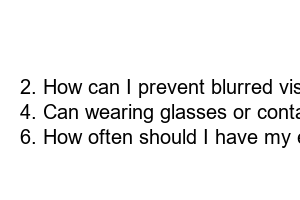시야가 흐려지는 현상
Blurred vision can be a scary and unsettling experience for many people. It can interfere with daily activities such as reading, driving, and even watching television. _Blurred vision_ can occur for a variety of reasons, including eye strain, dry eyes, refractive errors, or more serious underlying health conditions. Understanding the causes and potential treatments for blurred vision is essential for maintaining good eye health and overall well-being.
**Common Causes of Blurred Vision**
Blurred vision may be caused by eye conditions such as glaucoma, cataracts, or macular degeneration. **Refractive errors** like nearsightedness, farsightedness, or astigmatism can also lead to blurry vision. **Eye strain** from prolonged periods of reading or looking at screens can cause temporary blur. It is important to determine the underlying cause of blurred vision in order to receive appropriate treatment.
**Symptoms of Blurred Vision**
Symptoms of blurred vision include difficulty reading fine print, seeing double, and experiencing **eye fatigue**. In some cases, blurred vision may be accompanied by headaches or sensitivity to light. It is important to pay attention to these symptoms and seek help from an **eye care professional** if necessary.
**Treatment Options for Blurred Vision**
Treatment for blurred vision depends on the underlying cause. **Prescription glasses** or contact lenses can correct refractive errors, while **eye drops** may be used to alleviate dry eye symptoms. In some cases, surgery may be necessary to treat conditions like cataracts or glaucoma. It is important to follow the recommendations of your eye care provider for the best possible outcome.
**Preventing Blurred Vision**
To prevent blurred vision, it is important to take regular breaks from screen time and practice good **eye hygiene**. This includes proper lighting when reading or working on a computer, wearing protective eyewear when necessary, and staying up to date on eye exams. Maintaining a **healthy lifestyle**, including a balanced diet and regular exercise, can also contribute to good eye health.
**When to Seek Medical Help**
If you experience sudden or severe blurred vision, it is important to seek immediate medical attention. This could be a sign of a more serious health condition that requires prompt treatment. Do not ignore persistent or worsening vision problems, as they could indicate a more significant underlying issue.
**Summary**
Blurred vision is a common symptom with a range of potential causes, from refractive errors to more serious eye conditions. It is important to pay attention to symptoms of blurred vision, seek help from an eye care professional, and follow their recommendations for treatment and prevention.
**FAQs**
1. What are common causes of blurred vision?
2. How can I prevent blurred vision?
3. When should I seek medical help for blurred vision?
4. Can wearing glasses or contacts help with blurred vision?
5. Are there any home remedies for blurred vision?
6. How often should I have my eyes examined by an eye care professional?

